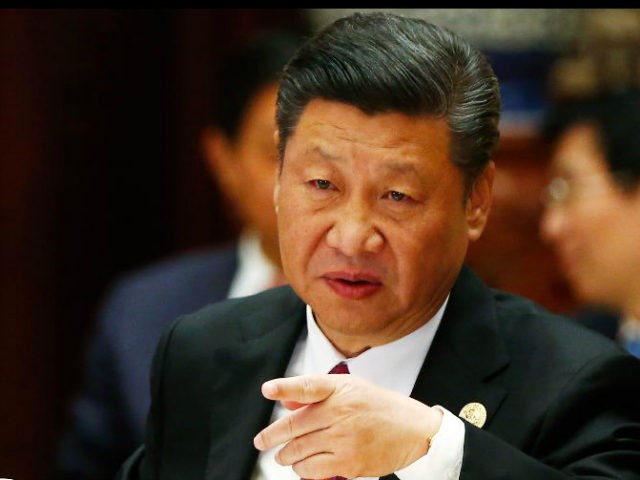The official newspaper of the Communist Party of China (CPC), the People’s Daily, condemned “pompous” and “incredibly exaggerated” pro-Chinese propaganda in the country, reporting that CPC leader Xi Jinping has ordered state media outlets to temper their language.
The People’s Daily, the Global Times, Xinhua, and other state publications have for years published stories inflating Xi’s achievements, proclaiming the superiority of traditional Chinese culture and condemning the United States and the West in general for characteristics ranging from defense of free speech to support for multi-party republican regimes.
“News written in a pompous style, represented by such expressions as ‘on your knees,’ ‘cry your eyes out,’ ‘scared silly’ have been all the rage recently,” the People’s Daily noted on Tuesday in a piece whose title asks, “Are We Still Confident in Ourselves?” stating also, “This way of writing harms the credibility of the media, pollutes the ecology of public opinion, and is not conducive to fostering a green cyberspace.”
The “blind optimism” of Chinese media “is worth rethinking,” the People’s Daily suggested, adding that Xi Jinping agrees.
“Writers should move away from this style of writing and use concise language, facts, and innovative solutions, as put forward by General Secretary of the CPC Central Committee Xi Jinping, so as to advocate a clean and honest writing style,” the newspaper noted, claiming that “pompous” pro-Chinese writing can run afoul of “mainstream values,” as defined by the CPC.
The People’s Daily does not dismiss the complimentary coverage as false, instead stating that China’s achievements are “no reason to brag” but reminding readers that “General Secretary Xi pointed out in a speech … that of all the political parties, countries, and peoples in the world today, none have as much cause to be confident as the Communist Party of China.”
In a similar piece published Monday, the People’s Daily cited invented examples of the language that it asserts no longer has a place in Chinese media.
“Articles with titles such as ‘The U.S. is frightened,’ ‘Japan is shocked,’ and ‘Europe has regretted’ get a lot of hits from readers,” the newspaper noted. “Some of these articles feature exaggerations or overgeneraliszations [sic]; for example, some claim that China is ‘world No.1’ in certain field.”
The problem with these pieces, the People’s Daily argued in this column, is that “they lack basic facts and deep thought.”
Should Xi implement this reform in the tone of Chinese state media, it would mean a significant change for the typical styles of the nation’s largest publications. In 2017 alone, Chinese state publications proclaimed that the Harvey Weinstein sexual abuse scandal proves that “Chinese traditional values” are superior to Western ones; the Soviet Union failed because it lacked “Chinese culture”; and that the West was doomed to fail because Western leaders “always believe in absolute conquest.”
An extensive profile of Xi Jinping in the state outlet Xinhua last year also went out of its way to proclaim that the world is riveted by Xi and his ability to “make things happen,” as evidenced by the “numerous clicks and many thumbs-up on the Internet” his speeches and political commentary garner. The story featured an anecdote about a man who drank some of the ink he was using to translate the Communist Manifesto because “the taste of truth is so sweet.”
Not to be left behind, in December, the People’s Daily proclaimed, “A unique path, a unique theory, a unique system, a unique culture; Xi Jinping’s thought on socialism with Chinese characteristics for a new era has developed a rich path for China that has transcended Western-centric theory.”
The growing human rights movement within China has also become one of the most common targets of vitriol for state media. Shortly following the death of Nobel Peace Prize winner Liu Xiaobo last year, the Global Times called Liu and his supporters “losers” and dismissed their lives as a “waste.”
The People’s Daily message this week may be aimed for North Korea as much as it is for China, as Pyongyang prepares for what appears to be inevitable economic profit following dictator Kim Jong-un’s in-person meeting with U.S. President Donald Trump. North Korean state media are more vitriolic and exaggerated than their Chinese counterpart, spending much of 2017 threatening a nuclear attack on the United States and sentencing Trump to death. Following the scheduling of the Trump-Kim summit, state media shifted its focus to the greatness of North Korea.
Pyongyang has “definitely risen to the position of a world-level politico-ideological and military power,” the state newspaper Rodong Sinmun declared in April. The week of the Trump-Kim summit, Rodong Sinmun condemned the West as a whole as “a corrupt society rushing headlong into its doom.”
Rodong Sinmun and the Korean Central News Agency (KCNA) have clashed with China before, particularly last year when the Chinese government warned Pyongyang against a preemptive nuclear strike on the United States. Rodong Sinmun declared China, without naming it, a “vassal state” of Washington, to which the Global Times responded that North Korea was “the most insecure country in the world.”

COMMENTS
Please let us know if you're having issues with commenting.